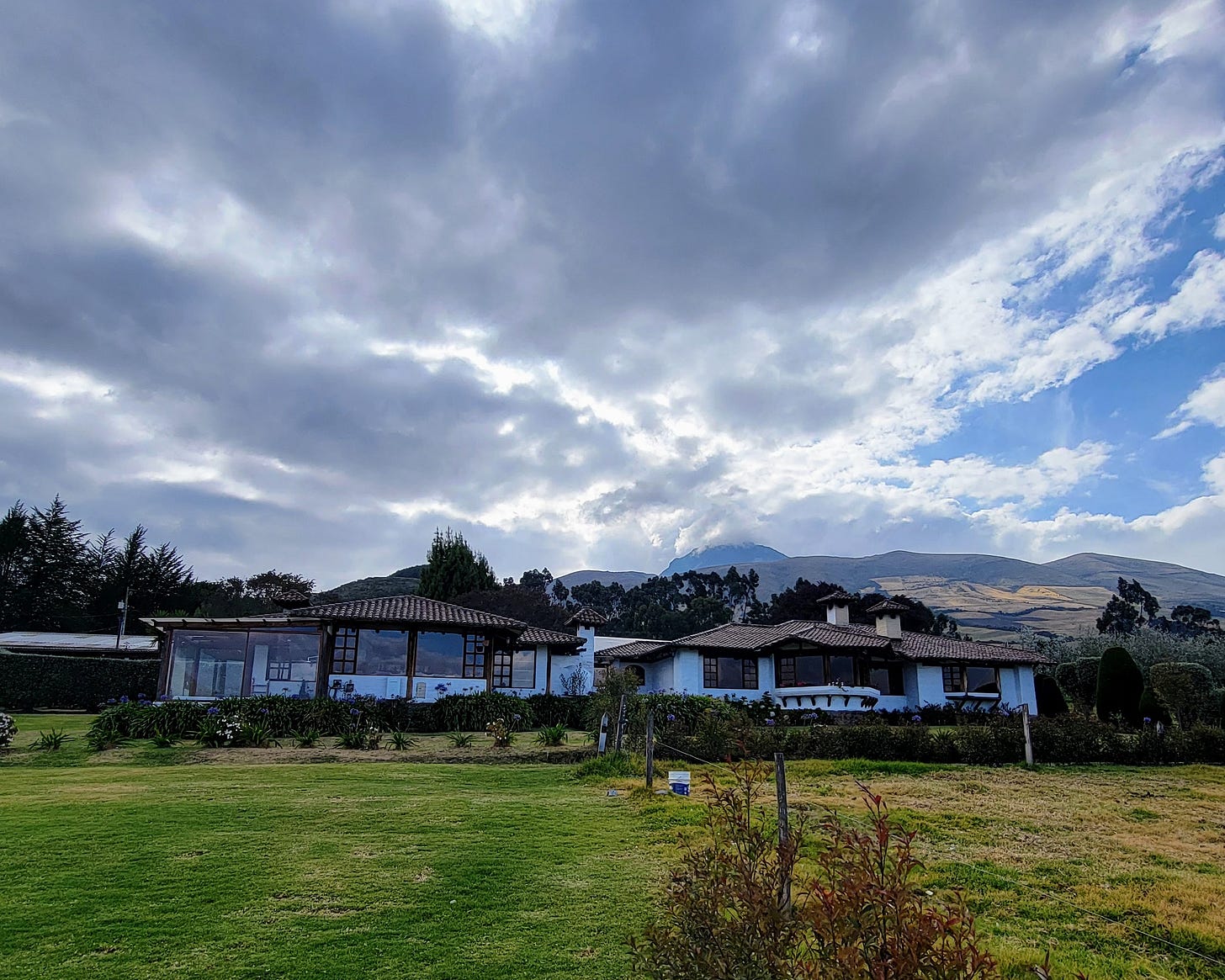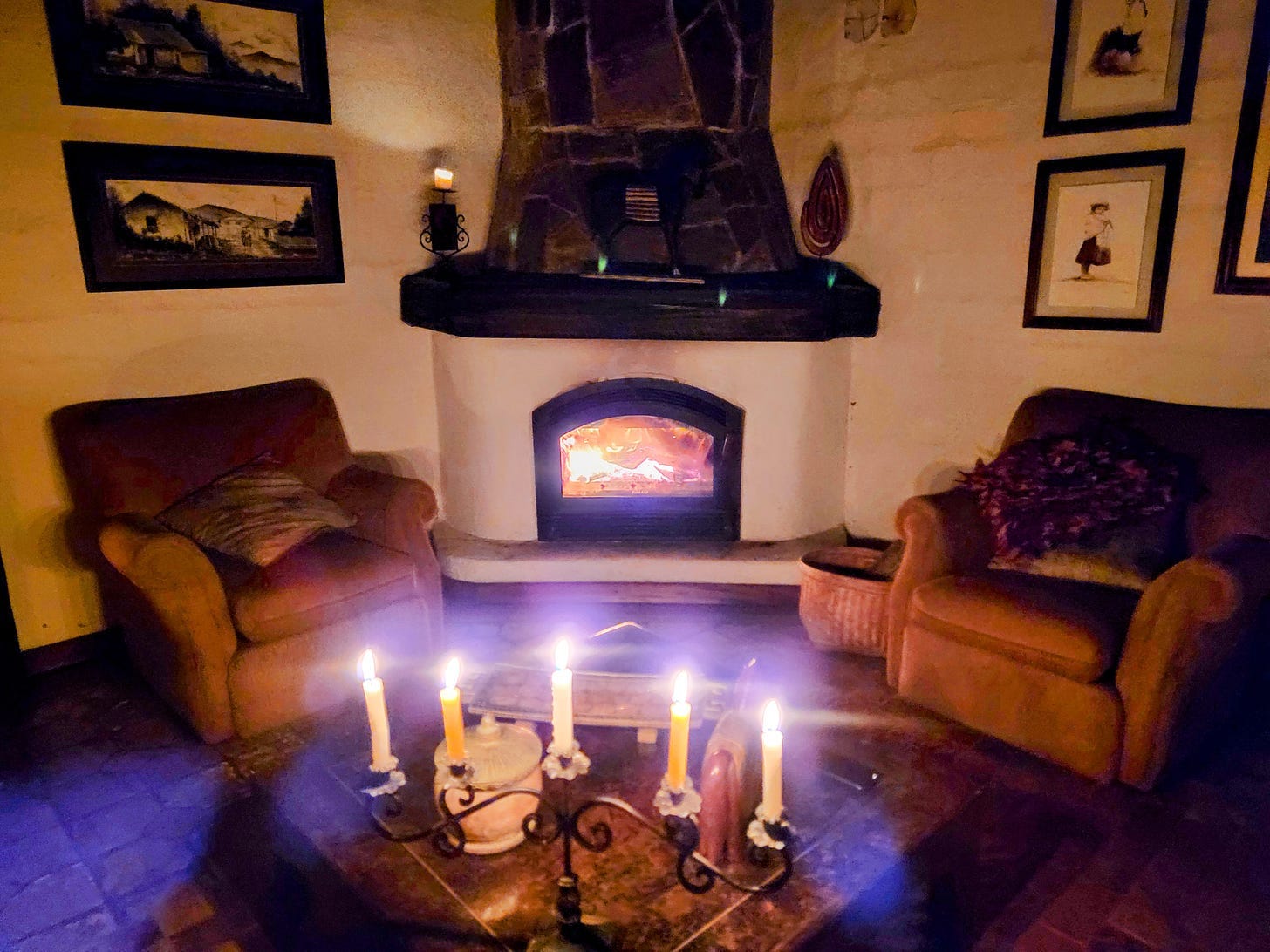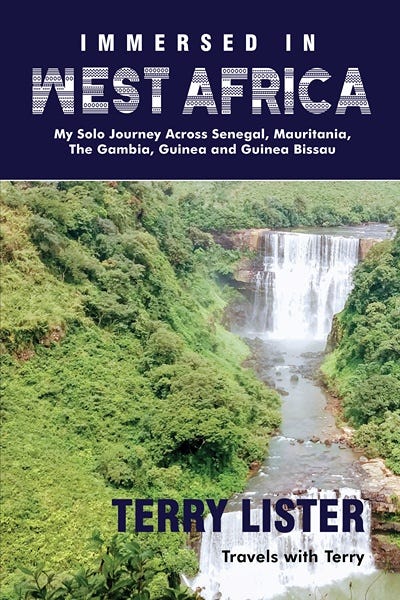Welcome to the third Halloween installment of Where’s the Bathroom?!
In honor of the spooky season, every October I depart from humorous travel stories to bring you a brush with the unexplained from my own experiences at home and abroad.
Paid subscribers, you will soon be getting the love you deserve! Look for new, exclusive information on how to build your own long-term travel plans, city-minis for cruise stops without shore excursion price tags, behind-the-scenes info on public posts, reviews and more.
Paid subscribers can also access prior years’ Halloween tales in the archive here and here. Thank you, thank you for your support!!
The full moon ascended the peaks of Rumiñahui and Cotopaxi volcanoes amid a halo of luminescent clouds. Cradled in the ancient valley at their feet, the twinkling lights of Machachi city extinguished all at once. The government of Ecuador was conserving energy, cutting the electricity for eight hours due to drought. Our hacienda plunged into darkness.
The house was one floor of thick, castle-like stone walls built against the slopes that mirrored those across the valley. I was left alone with the embers in the fireplace at the axis of the hacienda. Half the house contained the bedrooms, kitchen, and living areas. The other half sprawled away into the night, a wide, high-ceilinged space with its own bar and seating areas for dozens. Its vastness amplified the shadowed spaces, underscoring how many people could be, but weren’t, there.
A peculiar type of aloneness crept up on me, one that turned my usual contentment in solitude to discomfort. Seeking a way to soothe my mood, I scrolled through my Spotify playlists for company. My regulars felt mismatched to the ambiance. Country was too American; Rock was too loud and modern. There at the bottom of the list was a suggestion I’d never seen before: Femmes Fatales, solo female artists of the 1960s. That felt closer to right. Even if it didn’t encompass the Andean peoples who’d called the valley home for millennia, it was the era in which the house had been conceived and raised, along with the family that had lived there and still owned the property.
I had seen them at breakfast in the restaurant on the grounds, sitting together at a huge round table, the matriarch and her sons and their families, laughing. Their devotion to one another was palpable. Perhaps it would always have been so with them, or perhaps the isolation of the hacienda in the valley between nine volcanoes had helped to engender it.
The first notes of the playlist floated up from my seat beside the fire and permeated the room. I wasn’t worried about waking Tim or the kids. We were spread among the three bedrooms. Faith had begun in the double. In the midnight hour of our first night, by the weak yellow light of her bedside lamp, she had found a spider beside the bed. She smashed it and fled to the second twin in Aidan’s room. Tim took over the double when I developed an explosive cough. There was no chance they would hear the music from behind the heavy wooden doors.
The voice of Etta James glided through the hacienda, filling the empty spaces. “At last / My love has come along / My lonely days are over / And life is like a song / At last…” The tone was plaintive, a perfect match for the sentiment, longing and waiting and finally reaching a sense of satisfaction. The notes carried me to a different time and place, a time before I fell in love when I wondered if I would be the only person never to find it.
And then, the music turned the key on a memory that, like many cherished things, was kept safe in a cupboard rarely opened–the moment when I met the man like no one else before him, when we spun in slow circles in one another’s arms while the world lost its hard edges and disintegrated beyond us. “I found a dream that I could speak to / A dream that I can call my own / I found a thrill to press my cheek to / A thrill that I've never known.”
Note by note, the song cast a spell. Not just on me, but on the hacienda itself. The music and the house belonged to the same bygone era, and something in the air shifted when they met. It was as if they recognized one another, and the house’s own memories rose to meet the music, as if a summoning were taking place. Or perhaps, a reunion. “You smiled, you smiled / Oh, and then the spell was cast / And here we are in Heaven / For you are mine at last.”
At that moment, I had no trouble imagining the hacienda illuminated by candlelight, swirling with people, dancing, bustling with family, plates of food and glasses clinking, laughter, and above all, love. It was as though the past were coming to life before my eyes, their ghostly vibrations just below a threshold that I could detect, on the verge of materializing.
The vividness was overwhelming, and a feeling stole over me. I had been mistaken. It wasn’t the song that summoned the memories of the house, but the opposite. It was the energy of the hacienda that had inspired me to find its perfect harmony. The house had influenced me to play that song.
Goosebumps cascaded down my arms and spine. All sense of nostalgia and romance fled. The notion of manipulation by a force I couldn’t name, let alone see, was too much. I turned the music off, and left the dying embers to huddle in bed beneath the covers. The bed felt enormous without Tim in it. I wished he were beside me.
I stared out the bay window at the silhouette of Cotopaxi. Earlier that day, Manuel*, an employee of the hacienda, had driven us there. We hiked through the ash at an altitude that quite literally stole our breath to reach the base of the saw-toothed glacier that gripped the peak. On the drive home, Manuel explained how the volcano had been held in sacred regard by the indigenous Andean people, his people, as a home of the gods and as the sender of rain. When we returned to the property, he pointed out the wooded hill higher up the slope behind the hacienda. His grandfather still lived on the other side of it, and its forest was full of duendes, spirits like sprites or elves who liked to play tricks and lead people astray. I closed my eyes and drifted, wishing the volcano had sent enough rain that I could turn on a light, wondering about the people of the valley who lived in a world where spirits and gods were as real as the silhouettes of the mountains.
Someone sniffed hard in my ear. A throat cleared. Tim must have decided to come back to our room. I snaked a hand behind me to touch him. He wasn’t there. The bed was empty. I went completely still, scalp prickling. I lay in the dark listening, but there was no further sound.
Had I been dreaming? It hadn’t been Tim or the kids. They were too far away, and there was no other swish of movement to indicate they’d left their rooms. I replayed the sounds in my mind. The pitch was low, male. The throat clearing wasn’t like mine, born of illness. It was more one of politeness, a noise that called attention before an intrusion upon strangers, a noise that made the presence of someone known to one who thought themselves alone. It wasn’t meant to frighten.
Someone was in the room with me and he had wanted me to know he was there.
Unwilling to close my eyes again, I watched the light change over the mountains until dawn. When the sun appeared, I fell into a fitful sleep. Awaking several hours later, I kicked off the covers. There beside me, a spider curled upside down, legs in sharp angles, dead. I felt a little sick.
Was it a malignant token from my nighttime visitor? Had anyone else ever experienced something strange in the hacienda?
I kept the incident to myself. Tim and Aidan would dismiss it. Faith would be frightened. No need to make myself sound crazy, nor to foster insecurity. With no explanation, I insisted that Tim move back into the master bedroom. And for the remainder of our stay, nothing strange occurred.
The morning we were leaving, I couldn’t contain my questions any longer, but I wasn’t certain how to ask. I cornered Manuel. “Did someone die in the hacienda?” I thought, perhaps, it was the owner’s husband, whom I hadn’t seen with the rest of the family.
He replied no, and asked why. When I explained, he jerked his head to follow him outside. He led me to Tica*, another member of staff that we adored.
“La señora ha visto nuestros fantasmas,” Manuel said. I knew enough Spanish to understand. The lady has seen our ghosts.
Tica’s face lit up. “No te preocupes.” Don’t worry. She put her hands up in a placating gesture that I took to mean that I was in no danger. They meant me no harm.
“Tica sees a child in the hacienda.” My experience hadn’t felt like a child. “I’ve seen a man,” Manuel said. “A dark shadow.”
Tica nodded, beaming with an expression that made me feel like I had passed some kind of test, been found worthy somehow.
I felt some relief not to have been thought insane, and not to have been the only witness to the strange occurrences. Was it odd, though–odder–that I heard rather than seen something like they had? Was it a ghost? I thought it was the owner’s husband summoned by the music, but the spider in the bed had drained the romance out of the notion. Was it something else?
“You’re picking up on the energy of the valley,” Manuel said to reassure me, once and for all, in the same pragmatic tone that he had explained how a drought affected energy generation at the hydroelectric dam. The gods and spirits and duendes were a part of his heritage and his present, simple. He made a wide circle with his hand, meant to encompass all of the land, and forest, between the mountains. “This whole place is a graveyard.”

Free Reading
Each morning, The Sample sends you one article from a random blog or newsletter that matches up with your interests. When you get one you like, you can subscribe to the writer with one click. Sign up here. You get more of what you like, and it helps to support my newsletter at no cost to you.
Check out the latest writer’s life and craft articles on Story Street. Stay tuned for Halloween when the results of the first annual Nightmare on Story Street 100 word Horror Story Contest will be announced and published on the site!!
And last but not least, a memoir that unveils the Africa beyond the big tours, inspiring travelers to step out with courage and faith to experience the reality of life in West Africa beyond the classic tourist brochure.








Oh my! That is wild. I probably would’ve screamed and ran out to find the rest of my family. Kudos to you for keeping calm. I would’ve done exactly the same thing and ask the caretakers of the property if someone had passed. A good story!